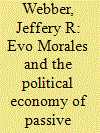| Srl | Item |
| 1 |
ID:
148273


|
|
|
|
|
| Summary/Abstract |
While the government of Evo Morales rules in the name of indigenous workers and peasants, in fact the country’s political economy has since 2006 witnessed the on-going subjugation of these classes. If the logic of large capital persists, it is legitimated in and through petty indigenous capitalists. This article argues that Antonio Gramsci’s conceptualisation of passive revolution offers a superior analytical point of departure for understanding contemporary Bolivian politics than does Álvaro García Linera’s more widely accepted theory of creative tensions. However, the dominant manner in which passive revolution has been employed in contemporary Latin American debates has treated the socio-political and the ideological as relatively autonomous from the process of capital accumulation. What is necessary, instead, is a sharper appreciation of the base/superstructure metaphor as expressing a dialectical unity of internal relations between ‘the economic’ and ‘the political’, thus avoiding one determinism or another. Through a reading of Gramsci that emphasises such unity, this article interrogates the dynamics of ‘extractive distribution’, class contradictions of the ‘plural economy’, and transformations in the urban labour market which have characterised Bolivia’s passive revolution under Evo Morales between 2006 and 2015.
|
|
|
|
|
|
|
|
|
|
|
|
|
|
|
|
| 2 |
ID:
081214


|
|
|
|
|
| Publication |
2008.
|
| Summary/Abstract |
David Harvey's concept of accumulation by dispossession is a useful framework for understanding the predatory activities of Canadian mining companies in Latin America. Capitalist imperialism is rooted in the logic of a socioeconomic system that is driven by the competitive pursuit of profit based on the exploitation of labour, and which is prone to over-accumulation. Capital, backed by state power, pursues a spatial fix to resolve the systematic crisis of over-accumulation. The creation of new spaces of accumulation is not an innocuous process; it inevitably involves the forceful and violent reorganisation of peoples' lives as they are subordinated to the whims of capital. Strategies of accumulation by dispossession by capital therefore commonly spawn popular resistance from the affected communities. The Canadian mining industry is the largest in the world, and much of its outward investment targets Latin America. The Canadian company share of the larger company exploration market in Latin America (and the Caribbean) has grown steadily since the early 1990s, up to 35% by 2004, the largest by far among all its competitors, with seven Canadian companies among the top 20 mineral exploration investors in the region from 1989 to 2001. This paper charts these trends of Canadian mining expansion in Latin America and then focuses on the community, environmental and worker resistance it is generating in the cases of Chile and Colombia.
|
|
|
|
|
|
|
|
|
|
|
|
|
|
|
|